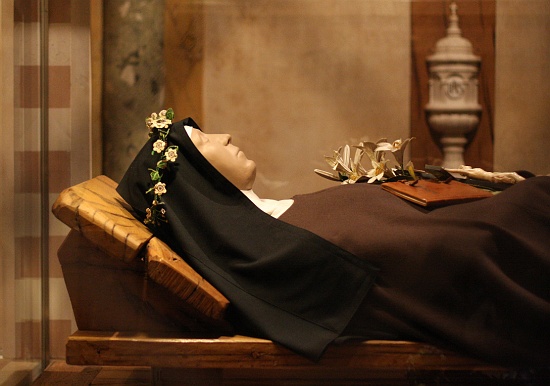St Clare: the saint which showed the most loving dedication to Christ’s humanity
Today, Wednesday 11 August 2021 is the feast of St Clare. She faithfully shared with St Francis the dream of living the gospel within the fraternity and in poverty.
Born as Chiara Offreduccio (1193-1253), St. Clare came from an aristocratic family in Assisi. Her familial ranks meant the domination of the social and economic activity within the Assisi region during the late medieval era. Her family were considered as diametrically opposite faction of the evolving middle class which St Francis hailed of coming from. Tensions ran high and resulted in the uprising of the commoners in 1198. Due to this upheaval Clare’s family was immediately exiled from Assisi to its safety till the year 1205.
When her family safely returned to Assisi the young Clare started to give herself to prayer, penance as well as charitable works. Empowered by her resolute faith she even decided, out of her free will, to remain a virgin. She did not want at all to enter a socially adventurous marriage. Upon hearing of her great love for God Francis met her and on Palm Sunday in 1212 Clare escaped from her family home and associated herself with Francis’ evangelical way.
Francis settled both Clare together with other noble women who shared her dream outside the city of Assisi, precisely at the Church of San Damiano. He wrote a simple way of life for these “Poor Sisters”. In the year 1228 Pope Gregory IX changed this regulations he himself had written. Nonetheless, Clare kept exerting her own pressure so that her vision of the Franciscan life be approved. Her perseverant tenacity paid at the end. In fact, shortly before her death in 1253 Pope Innocent IV had her Rule, which she wrote, approved. In so doing St Clare was able to conserve that radical commitment to poverty, to which she dedicated all her energies as a consecrated person to God. Let us not forget that St Clare’s Rule was the first one to be written by a woman and officially approved by the Church.
Clare died on August 11 1253 at the age of 59 years. Her last reported words were the following ones: Blessed be You, O God, for having created me.
In Clare’s theology we encounter a joyous poverty which strictly follows that of Christ. In her Rule the poverty that was to be lived by her sisters mirrored that most holy poverty of Jesus himself. She wrote: And for love of the most holy and beloved Child who was wrapped in such poor little swaddling clothes and laid in a manger and of his most holy Mother, I admonish, beg and exhort my sisters always to wear poor garments (Rule 2, 18).
And when in chapter 8 of the Rule she speaks about why the sisters shall not acquire anything of their own and for begging Clare plainly explains: Nor should they be ashamed, since the Lord made himself poor in this world for us. This is the summit of the highest poverty which has established you, my dearest sisters, heiresses and queens of the kingdom of heaven; it has made you poor in the things of this world but exalted you in virtue. Let this be your portion which leads into the land of the living. Clinging totally to this, my most beloved sisters, for the name of Our Lord Jesus Christ and his most holy mother, do not ever wish to have anything else under heaven (Rule 8, 2).
In her four letters to Agnes of Prague we notice how the joyous imitation of Christ’s poverty was the central aspect of St Clare’s as well as the Clarian way of life. In the First Letter Clare writes to Agnes:
Therefore, most beloved sister, or should I say, Lady worthy of great respect: because you are the spouse and the mother and the sister of my Lord Jesus Christ (2 Cor 11:2; Mt 12:50) and have been adorned resplendently with the sign of inviolable virginity and most holy poverty: Be strengthened in the holy service which you have undertaken out of an ardent desire for the Poor Crucified, who for the sake of all of us took upon himself the Passion of the cross (Heb 12:2) and delivered us from the power of the Prince of Darkness (Col 1:13) to whom we were enslaved because of the disobedience of our first parents, and so reconciled us to God the Father (2 Cor 5:18).
In her Second Letter to St Agnes of Prague St Clare asserts once more: This is the perfection which will prompt the King himself to take you to Himself in the heavenly bridal chamber where He is seated in glory on a starry throne because you have despised the splendors of an earthly kingdom and considered of little value the offers of an imperial marriage. Instead, as someone zealous for the holiest poverty, in the spirit of great humility and the most ardent charity, you have held fast to the footprints (1 Pt 2:21) of Him to whom you have merited to be joined as a Spouse.
In the Third Letter St Clare describes poverty as having strong arms. In other words, poverty gives stability to one’s following of the Christ. I see too, that by humility, the virtue of faith, and the strong arms of poverty, you have taken hold of that incomparable treasure hidden in the field of the world and in the hearts of men (Mt 13:44), with which you have purchased that field of Him by whom all things are made from nothing. And, to use the words of the Apostle himself in their proper sense, I consider you as a co-worker of God Himself (1 Cor 3:9; Rm 16:3) and a support of the weak members of His ineffable Body. Who is there, then, who would not encourage me to rejoice over such marvelous joys?
In her last and Fourth Letter to St Agnes St Clare considers poverty as the unshakable ground of Christ’s charity for us shown in his incarnation. Look at the parameters of this mirror, that is, the poverty of Him who was placed in a manger and wrapped in swaddling clothes. O marvelous humility, O astonishing poverty! The King of the angels, the Lord of heaven and earth, is laid in a manger! Then, at the surface of the mirror, dwell on the holy humility, the blessed poverty, the untold labors and burdens which He endured for the redemption of all mankind. Then, in the depths of this same mirror, contemplate the ineffable charity which led Him to suffer on the wood of the cross and die thereon the most shameful kind of death. Therefore, that Mirror, suspended on the wood of the cross, urged those who passed by to consider it, saying: “All you who pass by the way, look and see if there is any suffering like My suffering!” (Lam 1:2). Let us answer Him with one voice and spirit, as He said: Remembering this over and over leaves my soul downcast within me (Lam 3:20)! From this moment, then, O queen of our heavenly King, let yourself be inflamed more strongly with the fervour of charity!
Amazing is Clare’s love for holy poverty! In her Testament she writes: 11 Therefore, I, Clare, the handmaid of Christ and of the Poor Sisters of the Monastery of San Damiano—although unworthy—and the little plant of the holy Father, consider together with my sisters our most high profession and the command of so great a father. We also take note in some sisters of the frailty which we feared in ourselves after the death of our holy Father Francis, He who was our pillar of strength and, after God, our one consolation and support. Thus time and again, we bound ourselves to our Lady, most holy Poverty, so that, after my death, the Sisters present and to come would never abandon her (no.11).
Christ’s poverty led her to love passionately the Jesus in the Eucharist. She saw him rescuing Assisi from the invasion of Fredrick II’s soldiers at the gates of her convent by showing the Blessed Sacrament and kneeling in prayer. Her ardent love for Christ’s present in the Eucharist led her to love him in the sisters she lived with, close and far.
This great woman teaches you and me that it is when we let Christ’s humanity changes us in itself that we can finally find that much desired peace we all are craving for!
Fr Mario Attard OFM Cap



